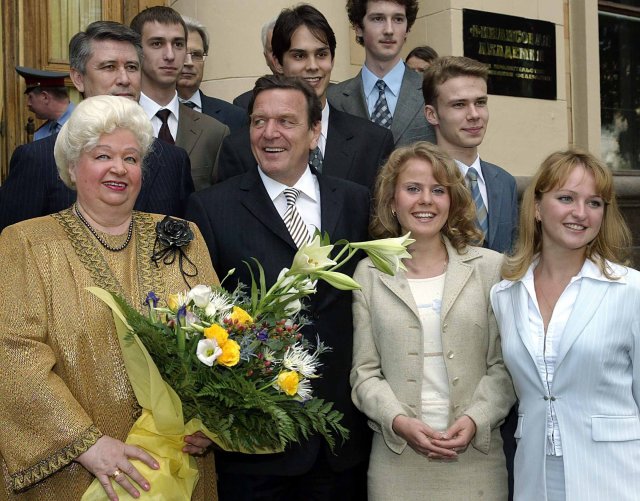It was nice in Moscow: Chancellor Gerhard Schröder under the spell of German interests in front of the Finance Academy in the Russian capital in 2004
Photo: dpa
Sleepwalker or dream dancer? If you look at Germany’s Russia policy since German unification, many see a pile of rubble, others are still sitting on the “special train to Moscow.” Under this title, the historian Bastian Matteo Scianna, who completed his habilitation at the University of Potsdam, has now presented a first scientific account of the Chancellorships of Kohl, Schröder, Merkel and Scholz and their Russia policy. He also keeps an eye on other countries in order to recognize what is special about Germany’s Russia policy.
The basic question, actually of all politics, is also in this case: Should the historically charged relationship with Russia be determined by a values-based or an interest-based policy? In other words: Should Germany insist on Russian progress in questions of democratization, human rights and the rule of law and make the relationship dependent on this, or should German, mostly economically based, interests be in the foreground?
For Helmut Kohl that was a different question. German unification was not yet complete. The Soviet Union and with it the young post-Soviet Russia collapsed economically and politically. For Kohl, the most important thing was to complete the unification process (Two-Plus-Four Treaty) and the withdrawal of Soviet and Russian troops from Germany. The checkbook was pulled out and a very personal relationship was built between Kohl and Gorbachev or Yeltsin.
Scianna not only describes the negotiations in a cardigan or a towel in the sauna, but above all the inclusion of the Western victorious powers of the Second World War and Poland in the unification process. These were foreign policy feats by the Kohl government that met with Scianna’s approval.
He is already more critical of his successor in the Chancellery, Gerhard Schröder. He turns the SPD chancellor into a “traveling salesman from Hanover” and describes the comet’s tail of business bosses following Schröder on his numerous flights to Moscow. Pure politics of interests, no trace of “Western values”!
At that time it was already about Germany’s energy security. Schröder thought more of one multipolarless to one multilateral World order after the Cold War. Germany should take an important place in this, ideally one of the many poles. Schröder’s relationship with the USA was notoriously bad; at times he joined forces with France in opposing Washington, and Russia was always on that side.
Scianna substantiates this attitude with many sources, which he dismisses as far too lenient towards the imperialist Russia. Schröder was neither a sleepwalker nor a dream dancer, but perhaps the first duped among the German Chancellors.
His successor Angela Merkel comes off much better with the author. It also pursued a clear policy of interests – especially in the energy issue (Nord Stream). She always called for Russian progress in values, but without achieving any major successes. She was not the only one who had hope for a more liberal attitude with the Moscow interim leader Dmitry Medvedev, but she was soon disappointed – and even more so when Vladimir Putin resumed his rule, which had only been interrupted pro forma due to the – now changed – time limit of the Russian presidency. He had nothing but ridicule for values, but he could understand interests.
The crises piled up: Kosovo, Serbia, Georgia, Moldova, and early on Ukraine – initially the problematic eastward expansion of the EU and NATO, the Iraq war and the relationship with Iran. German Russia policy was challenged everywhere, and the author traces these dramatic scenarios in an exciting way.
At the end, Scianna outlines the Russia policy of the traffic light coalition that has just collapsed, in which Foreign Minister Annalena Baerbock pursues a values-based policy and is criticized for it, just as Schröder was at the time, for his interest-based policy. The author criticizes the initial renunciation of arms deliveries to Ukraine; He considers Scholz’s hesitation to focus on maintaining world peace to be too soft a position towards the aggressor Putin. The well-known US journalist Bob Woodward’s appreciation of President Biden’s policies, which combined measured military toughness with diplomatic caution in the interest of maintaining peace, is certainly not a role model for Scianna. He concludes with the words: “The German special train drove, and drove, and drove – laden with good hopes.”
Bastian Matteo Scianna: Special train to Moscow. History of German policy towards Russia after 1990. C. H. Beck, 719 pages, hardcover, €34.
Subscribe to the “nd”
Being left is complicated.
We keep track!
With our digital promotional subscription you can read all issues of »nd« digitally (nd.App or nd.Epaper) for little money at home or on the go.
Subscribe now!
